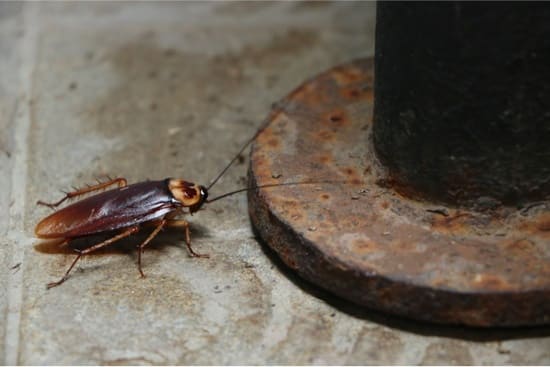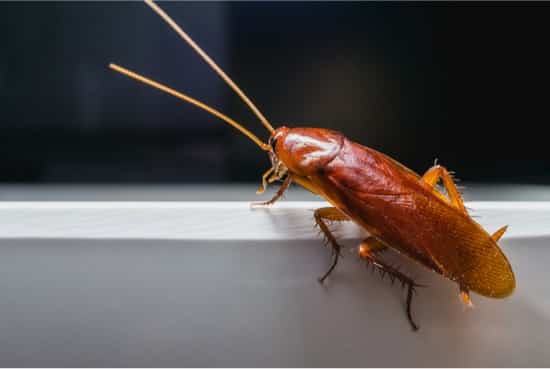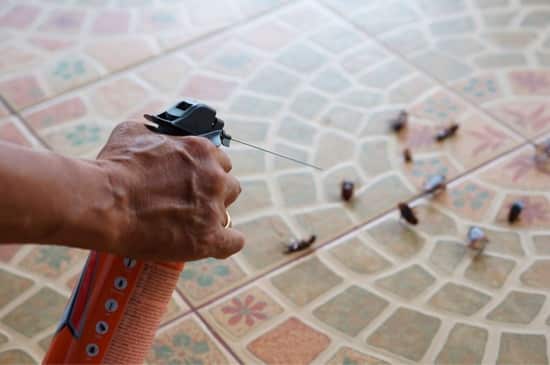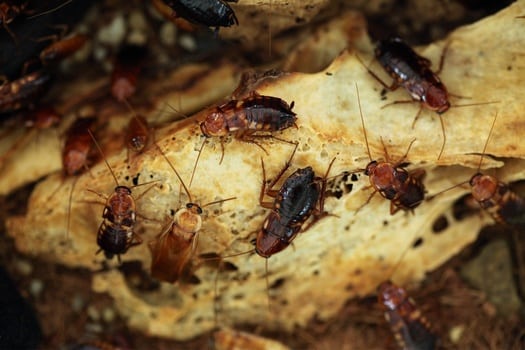Having both bed bugs and cockroaches is a nightmare. One feeds on you at night, and the other causes havoc in your kitchen and around your home.
Cockroaches are bigger, can fly, and come out more during the day. Bed bugs bite frequently and feed on your blood. Both bed bugs and cockroaches are difficult to kill, although bed bugs are squashed more easily. They are equally bad, but in completely different ways.
Fortunately, it’s possible to kill both infestations in one go, with the same treatment method. But we’ve explained the most important differences between bed bugs and cockroaches.
Can Bed Bugs and Roaches Live Together?
Having one pest in the home is bad enough. But it’s possible to have both pests at the same time. Neither bug gets in the others’ way. Here’s why you can have both bed bugs and cockroaches:
- Live in different places. Bed bugs live near your bed; cockroaches live near the kitchen.
- They are made worse by poor hygiene. Cockroaches feed on garbage. Bed bug infestations grow worse if you don’t change and treat your bedding, and if your room is messy.
- Feed on different things. Bed bugs feed on blood, while cockroaches eat garbage and leftovers. They aren’t in competition.
You may have both infestations at the same time. This can be exceptionally stressful. However, they can both be killed with the same permethrin-based sprays.
Do Cockroaches Eat Bed Bugs?
Cockroaches can eat bed bugs. Roaches are notorious for eating anything, whether that’s waste food or other living animals. They are omnivorous scavengers, and will eat:
- Sweet things containing lots of sugar or starch
- Meaty leftovers
- Other bugs, including spiders
- Other cockroaches
- Random things like books, things that are rotting, and even hair
But just because they can, doesn’t mean they will. Bed bugs hide in places that cockroaches can’t access. Specifically, they hide under your mattress or inside bedside furniture. These places aren’t necessarily easy for a roach to reach.
This means that while cockroaches might feed on the occasional bed bug, they won’t eat enough to get rid of the infestation.
Do Bed Bugs Feed on Cockroaches?
Bed bugs don’t solely feed on humans. They can feed on any mammal. That means they can feed on pets like cats and dogs. If they live in an abandoned house, they can even feed on rats. That’s how populations survive even when it’s a mystery how they did.
However, bed bugs can’t feed on other bugs. They have harder outer shells that a bed bug couldn’t bite through. Our skin is comparatively much softer and easier for them to pierce holes in.
Even if they could, bugs don’t have the same kind of blood that we do. Bugs, cockroaches, and bed bugs included, have a fluid called ‘hemolymph.’ It’s a blue-green color rather than red like vertebrate blood.
This fluid performs the same functions as blood, but contains different things. It doesn’t contain the nutrients that bed bugs need. Bed bugs wouldn’t think to feed on anything but mammals like us.
Are Bed Bugs or Cockroaches Worse?
There are several ways that each bug could be ‘worse’ than the other. The main ones are their bites, how difficult they are to kill, and how quickly they can come back.
1) Bites Frequency
Bed bugs are notorious for their bites. They are a parasite, and people are their hosts. They have lived with us for thousands of years. The bites they leave behind become red, swollen, itchy, and painful. Here’s some advice on avoiding getting bitten by bed bugs while sleeping.
Cockroaches don’t bite anywhere near as often as bed bugs. They feed on scraps of regular food, not on blood. But if there is no food, they may bite you to check whether you’re food or not.
They will only bite when there is no food left. If there is garbage available for them to look through, they will choose that, every time. But when there is no food, or there isn’t enough for the whole population, they may bite.
This is exceptionally rare. Individual bed bugs bite every other night, so if there is a large infestation, that means dozens of bites a night. Cockroaches hardly ever bite.

2) Reaction to Bites
When bed bugs bite, you don’t feel it at all. They use a special salivary chemical compound that numbs the bite site. This allows them to feed without you noticing and disturbing them.
After a while, the bites turn red and swollen. They start to itch. This is the histamine response, which occurs whenever something unknown enters the body. If you have a significant infestation, you could have dozens of bites at once.
Cockroach bites are entirely different. Because they haven’t developed to feed on animals, their bite doesn’t contain numbing compounds. You would feel it straight away. The bite swells up like a bed bug bite.
Both kinds of bite can get infected, too. This usually occurs when you scratch the bite and open the wound. It’s slightly more likely that a roach bite will become infected because they live in and eat refuse. They can transfer that bacteria to you.
3) Size Difference
Bed bugs are around the size of an apple seed. Adults are 1/5 of an inch long, and are brown, so they are visible to the naked eye. Find out how to identify bed bugs.
Cockroaches are much bigger. American roaches are around one and a half inches long. They’re also much wider than bed bugs, at around an inch (when one and a half inches long). You can’t mistake one kind of bug for the other, as roaches are so much bigger.
The biggest domestic pest cockroaches are between three and four inches long. These can be found when there is plentiful food for them.
In a way, smaller pests are worse. They hide more easily, and there will be more of them.
4) Fight or Flight?
Both bugs dislike people. If they encounter you when you’re awake, they will do their best to avoid you. Both kinds of bug do this by staying away from you, by hiding under things.
But what if you try to kill them? Will either kind of bug attack you then? Bed bugs lack any means to attack you. They don’t have jaws, only their feeding apparatus, which can’t be used for attacking.
Cockroaches do have jaws they could nip you with. But when you try to squash them, they will run away rather than turn to fight you. Their odds of surviving are much better when they run away.
5) Nocturnal or Diurnal?
It’s difficult to say whether it’s better or worse if a bug is nocturnal. The fact that a bug is nocturnal makes them harder to find and kill. But a bug that’s diurnal (active in the day) is more likely to annoy or scare you.
Both bugs are nocturnal. Bed bugs only feed at night, and they only come out when they feed. They spend the daytime digesting their food, mating, laying eggs, or sitting still. If you disturb them during this time, they’ll run away.
Cockroaches are nocturnal too. They have learned that if they eat during the night, they are less likely to be disturbed or attacked. They stay nocturnal so that you won’t notice them when they go about their business.
However, cockroaches are more likely to come out during the day than bed bugs. They are faster and more agile, so they can avoid you better if you try to kill them. They can also move around during the day if necessary.
6) Can They Fly?
Bed bugs live under your mattress, and will access you by crawling to you. Then, they will crawl back where they came from. They don’t ever go outside, either. There’s no need for them to fly.
They used to fly. Their ancestors evolved from bugs that could fly. They lost their wings over time so they could fit into tighter spaces. They still have small nubs where their wings used to connect to their back.
What many people don’t know is that cockroaches can fly. Their hard shell can open wide like a ladybug’s to reveal their wings underneath. They don’t often need to fly, which is why so few people know they can.
They don’t frequently choose to do so. Instead, they rely on cover to scuttle around without being noticed. But they can fly away from you, or towards you, if they need to.

7) Do They Spread Disease?
Bed bugs feed on your blood. You would think they can spread diseases from person to person. Some of these diseases could even be quite serious.
However, there have been no reported cases of bed bugs spreading disease. According to the Archives of Dermatological Research, “public health reports have thus far failed to produce evidence that major infectious disease outbreaks have been associated with bed bugs.”
The main reason is that they feed only once before digesting. During digestion, any blood is either used up or wiped away. There’s no risk of contamination.
Not only that, but they tend to only feed on one person. If they feed on two people, they are likely a couple, and may already share any diseases that can be borne through bodily fluids.
Cockroaches, on the other hand, can spread disease. They crawl over food, so if you eat any fresh food, you could be eating bacteria they leave behind. They also crawl over food preparation surfaces. Diseases they spread may include dysentery and salmonella, both of which are serious.
They can also trigger asthma and allergies.
8) Do They Cause Stress and Anxiety?
One overlooked symptom of bed bug infestations is the stress they cause. There are many reasons why they stress people out:
- They’re difficult to spot, which can make you paranoid.
- They invade your personal space and feed on you.
- You can catch them from public spaces.
- You can’t kill them on your own, at least not quickly or easily.
- Once the infestation has been killed, they can come back, which again makes you paranoid.
Once you kill the infestation, you may experience bed bug PTSD. This is a recognized condition that shares the hallmarks of classic post-traumatic stress disorder.
Cockroaches can cause stress too. It can be frightening to spot one scuttling around. But because they don’t interfere as much with your sleep, the effect isn’t as bad.
9) When are They Most Active?
We already know that bed bugs and cockroaches are most active at night. But when are they most active during the year?
Here, both bugs are equal. Insects like warm and humid conditions, but not too hot. In warm summer temperatures, their metabolism is faster. This means:
- They can grow from an egg to an adult faster.
- They need to feed more frequently.
- They can create and lay eggs more frequently.
That’s why both bed bug and cockroach infestations get larger during the summer.
But that doesn’t mean bed bugs go away during the winter. They continually feed during the fall and winter months. Comfortable indoor temperatures mean they don’t have to ‘hibernate’ over winter. The same applies to cockroaches, too.
Are Bed Bugs or Cockroaches Harder to Get Rid Of?
One way in which cockroaches are easier to kill is that they eat regular food. Traps containing food and poison bait can both be used effectively against cockroaches. Glucose bait traps are an example.
Bed bugs can’t be killed this way. They don’t feed on anything but blood, so they won’t fall for the bait. There are bed bug lures and traps available, however.

Killing Bed Bugs and Cockroaches
Both can be killed using the same methods. If you have both pests infesting your home, you can use the one treatment method. The best way to kill both pests is with heat treatment.
Heat treatment is where the temperature of the house is raised to over 120 degrees. The higher the temperature, the quicker the bugs will die. This requires specialist equipment and preparation so the heat reaches the whole room, and there are no escape routes.
This form of treatment has the advantage of killing other pests, like termites and ants. So, if you’re treating an old house with other pest issues, heat treatment can kill each one at the same time.
Both pests can be killed using the same pesticides, too. Permethrin treatments are the most common for bed bugs, but can kill cockroaches too. Other pesticides work on both bugs, too.
According to PLoS ONE, bed bugs may have genes that help them avoid death by pesticide. But the same applies to cockroaches, which are becoming increasingly hard to kill.
Are Bed Bugs or Cockroaches Harder to Squash?
Bed bugs aren’t strong, and can be squashed easily. Their bodies can’t withstand lots of pressure. Their legs are thin and weak.
Cockroaches are a lot hardier than bed bugs. Their body is a lot bigger and stronger than that of a bed bug. If you have an infestation, you’ll already know. Sometimes even when you hit them directly with something they survive.
Also, bed bugs feed on blood. When they have a meal, their bodies become elongated and vulnerable. They are exceptionally easy to squash at this time.
Bed Bug vs. Cockroach Infestation
Once killed, both infestations can come back quickly. Eggs of both species are notoriously difficult to kill, and two can restart an entire infestation.
This is especially the case when you live in an apartment. You can bug bomb your apartment until they all die. But they can re-infest your home by sneaking in from next door.
There are ways that bed bugs are worse, and ways that cockroaches are worse.


Great article but I didn’t find any solution to to these problems except heat. Is this the only solution you recommend offer Even after getting rid of the pest or is there something that can be done each week or monthly?
Diatamaceous earth. Had a bedbug infestation and haven’t seen once since.